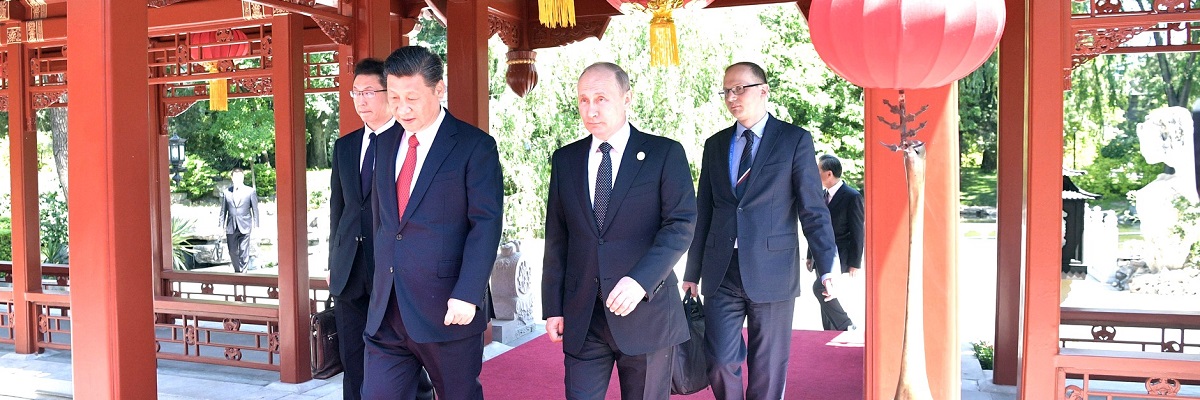Diplomacy
China Exploits Russia’s Vulnerabilities

Image Source : Wikimedia Commons
Subscribe to our weekly newsletters for free
If you want to subscribe to World & New World Newsletter, please enter
your e-mail
Diplomacy

Image Source : Wikimedia Commons
First Published in: Dec.05,2023
Dec.29, 2023
According to reports from Chinese media in late November, Beijing has refused to invest in the construction of the Power of Siberia-2 natural gas pipeline, proposing instead that Moscow fully cover the multibillion-dollar project. China also insists on substantial discounts for Russian gas, demonstrating strong “bargaining power” in negotiations with the Kremlin (South China Morning Post, November 24). Power of Siberia-2 is pivotal for Russia in mitigating the losses incurred after Gazprom’s withdrawal from the European market. As Western sanctions have weakened Moscow’s geopolitical leverage with its energy resources, Beijing has capitalized on the situation to increase energy flows to China at cheaper prices. Most economists argue that Moscow cannot fully compensate for the losses resulting from limited access to European markets. They also point out that the gas supplies currently flowing through the Power of Siberia-1 pipeline are already being sold to China at almost half the price of rates for the European Union and Turkey. Russian oil and gas analyst Mikhail Krutikhin emphasizes that Beijing has little interest in the construction of the Power of Siberia-2 pipeline, as China does not require large quantities of natural gas. He notes that the planned capacity of the new pipeline is 50 billion cubic meters (bcm), while Gazprom, on average, has exported 155 bcm to the West. According to Krutikhin, with the discounts, Russian gas exports to China do not even cover the operational costs of their extraction and transportation. The Kremlin, nevertheless, is forced to construct a second gas pipeline because it cannot guarantee the promised gas supplies of existing agreements without it due to the limited gas deposits supporting Power of Siberia-1 (VOA Russian Service, November 28). China’s exploitation of Russian vulnerabilities should not come as a surprise. Experts observed last spring that Beijing only supports Moscow to serve Chinese interests, for example, leveraging Russian anti-Western narratives in its own propaganda and treating the Russian Far East as a “resource colony” (see EDM, February 6). China will not assist Russia to its own detriment. Marina Rudyak, a professor of Sinology at Heidelberg University, believes that the Chinese government may genuinely fear that a Russian victory in Ukraine could strengthen Moscow’s influence in Central Asia and beyond (Svoboda, May 21, 2022). At the same time, Beijing has provided practical assistance to Moscow for projects personally important to Russian President Vladimir Putin. For example, China has actively shared its experience with censorship and digital control over the Internet since 2015, offering insights on the functions and capabilities of China’s “Great Firewall” (Kremlin.ru, June 5, 2019; Radio Free Europe/Radio Liberty, April 5). This cooperation, however, does not prevent China from competing with Russia for influence in Central Asia, the South Caucasus, and other regions (Gazeta.ru, September 20, 2019; see EDM, October 5, 2022, November 15, 2022, May 24, August 10). Moscow’s predicament lies in unrealistic expectations for cooperation with its “Eastern partners,” including China and other “non-Western” countries. Putin has repeatedly stated that the expansion of the BRICS countries (originally Brazil, Russia, India, China, and South Africa) will become a movement “against the hegemony and neo-colonialism policy of the West” (Izvestiya, August 23). In contrast, the organization’s members are not planning to sever relations with Western countries and are attempting to extract maximum benefits in finding a balance between the East and West. Another of the Kremlin’s unrealistic hopes was the dream of creating a single currency for BRICS members to strengthen Moscow’s ability to circumvent sanctions. Such talks began emerging in the Russian press at the end of last year (Sibnovosti.ru, December 3, 2022). By mid-summer, central Russian media predicted that the currency would be created in August, noting that the realization of this idea was “closer than ever before” (Moskovskij komsomolets, July 9). Pro-Kremlin experts discussed how the new currency would replace the “toxic and inconvenient” US dollar and be used for intergovernmental payments and settlements (Vechernyaya Moskva, July 3). The most optimistic among them speculated that the dollar might not withstand this challenge (Iarex.ru, May 17). Following the August BRICS summit, Russian officials were compelled to acknowledge that their partners had no intention of creating a single currency in the near future. On August 24, Foreign Minister Sergei Lavrov officially relented on Moscow’s hopes for a unified currency at the summit in Johannesburg (Rossiyskaya gazeta, August 24). That same day, South African Finance Minister Enoch Godongwana announced that the creation of a single currency had never been discussed within the BRICS format, even informally (Forbes.ru, August 24). A parallel situation of unrealistic expectations for allies is unfolding for Russia with Iran. In early 2022, Russia extended a credit line of $1.4 billion for the construction of the Sirik thermal power station in Iran, a debt that Tehran has yet to settle. In July 2022, Gazprom and the National Iranian Oil Company signed a memorandum of understanding and cooperation, leading to agreements on projects valued at $40 billion. These projects encompass the development of the Kish and North Pars gas fields and Russia’s involvement in the operations of the South Pars field (Nezavisimaya gazeta, November 7, 2022). Even with the agreements in hand, little tangible progress has been made. The lack of progress in joint Russian-Iranian projects closely mirrors the breakdown in Russian-Chinese cooperation with Power of Siberia-2. Independent analysts noted last year that Moscow should not anticipate Iran’s assistance in modernizing underdeveloped infrastructure along the “North-South” corridor. Russia has sought to develop this route to connect with the Persian Gulf and Indian Ocean via the Caspian Sea and Iran. Even if the new corridor is further developed, it will not be able to wholly replace the traditional transit routes Russia utilized before its war against Ukraine (Carnegie Politika, October 28, 2022). Russia is being increasingly forced to supply strategic resources to partners on highly unfavorable terms in exchange for minor displays of political support and assistance. In the long run, such a policy will likely result in significant losses for Moscow. While cooperation with China and Iran has improved in some areas, the current circumstances underline that, in the end, both Beijing and Tehran will pursue their own interests, even at Moscow’s expense.
First published in :

Ksenia Kirillova is an investigative journalist with 16 years of experience including work with Ural Worker (2008-2010), the Ural branch of Russian opposition newspaper Novaya Gazeta (2011-2013); several services of Radio Free Europe/Radio Liberty (RFE/RL), and Ukrainian English-language media Kyiv Post, Euromaidan Press, and Stop Fake project. Ms. Kirillova is an analyst of the Jamestown Foundation and the Center for European Policy Analysis (CEPA) focused on analyzing Russian society, mentality, Russian propaganda (including in the US), “soft power,” and foreign policy. She has also authored several hundred articles on these topics for the Atlantic Council, Homeland Security Today (US), Stratfor, and others. In the United States, she cooperated with the Associated Press, Newsweek, The Daily Beast, ABC7, Newsy, and other media. She has made several presentations to the US State Department's Foreign Service Institute, NATO Headquarters Supreme Allied Commander (Norfolk), and Eisenhower School for National Security and Resource Strategy.
Unlock articles by signing up or logging in.
Become a member for unrestricted reading!